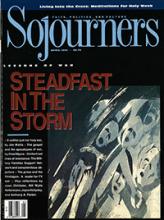No one has ever yet been able to find the basis of political power or the reason why people always irresistibly and irremediably obey it ... Political power has many dimensions, e.g., social, economic, psychological, ethical, psycho-analytical, and legal. But when we have scrutinized them all, we have still not apprehended its reality ... The disproportion noted above leads me to the unavoidable conclusion that another power intervenes and indwells and uses political power, thus giving it a range and force that it does not have in itself ... One might ask whether technology is not also one of these powers. The answer seems simple enough.
-- Jacques Ellul, The Ethics of Freedom
The most prominent public feature of this deathly Gulf war has been the celebrated vindication of the American technological myth. This technological superiority is evinced in the heaviest (and ostensibly most accurate) bombing in the history of the world. People of faith and conscience have felt the spectacle of this "triumph" as a heavy weight on their souls, indeed as a heart-sickness.
The American people and the nations of the world sit transfixed before images of technical prowess. The machinery of warfare has been named and paraded, analyzed and glorified to death. On television, people watch laser-guided missiles float in the front doors of buildings, as if this were the finals of some video game championship. The papers are full of diagrams and technical descriptions. Popular knowledge of the planes, the weapons systems, and the esoteric acronyms becomes a mark of the well-informed.
What goes unnoticed is the extent to which technology itself has been a driving force in the creation of this war. The technological system has a mind and a logic, an independence and momentum all its own. It is indeed one of the pre-eminent principalities of the present age.
Read the Full Article

